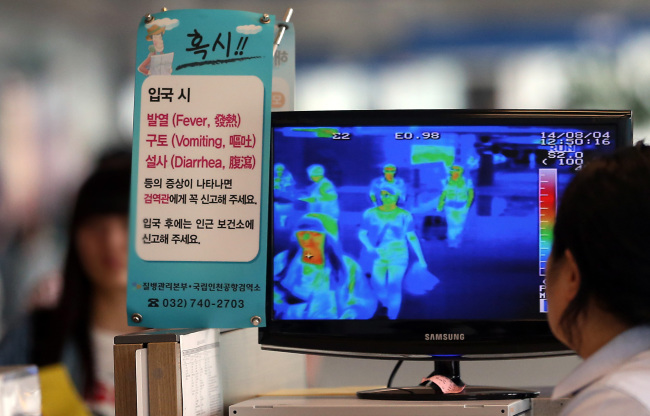South Korea plans to toughen quarantines and expand travel alerts to citizens who plan to visit West Africa as a preventive measure against the entry of the deadly Ebola virus, which has claimed more than 850 lives in the region since March.
The Health Ministry held an emergency meeting with the Prime Minister’s Office and the Foreign Ministry on Monday to discuss ways to prevent the disease from entering Korea.
There is no vaccine or specific treatment for the Ebola infection, which has a fatality rate of up to 90 percent.
The Foreign Ministry issued a special travel warning for Liberia, Sierra Leone and Guinea, the three countries primarily affected by the outbreak, advising all Koreans to cancel travel plans to the region.
The ministry is also monitoring a total of 158 Korean nationals who are currently residing in the three countries. There are 88 residing in Sierra Leone, 25 in Liberia and 45 in Guinea. Most of them are religious missionaries and those who work in the fishing industry.
“We are checking on the Korean residents in the three countries every day,” said a senior official at the Foreign Ministry. “We also have been advising them on how to prevent contracting the disease, as well as what they should do if they think they are infected by the virus. We are also thinking of ways for them to leave the region should it become necessary.”
While no Ebola cases have been reported in South Korea, the Health Ministry is setting up some 544 emergency beds in 17 hospitals nationwide in case of an outbreak.
 |
A quarantine officer monitors travelers’ body temperatures at Incheon International Airport on Monday. (Yonhap) |
A total of 21 Korean individuals who have recently visited countries in West Africa ― Nigeria, Liberia, Sierra Leone and Guinea ― were tested for Ebola, the government said. Among them, 13 are confirmed safe, while the other eight are still being monitored.
Seoul is also considering dispatching medical staff and researchers to West Africa to study the development of the disease in the region.
Local hospitals are also being equipped with reverse transcription polymerase chain reaction (RT-PCR) assays, the latest diagnostic technique for the Ebola virus, the government said.
Isolating the Ebola virus in a tissue culture ― a process in the RT-PCR assay ― is known to be a high-risk, dangerous procedure, and can be performed safely in only a few high-containment laboratories worldwide.
The prevention announcement came after Seoul recently rejected the entry of three Nigerian college students who had been scheduled to attend an international conference at Duksung Women’s University in Seoul. Two people have been infected with Ebola in Nigeria as of Monday.
More than 10,000 local netizens demanded the government to deny entry to all participants from African countries, including Algeria and Congo, prior to their arrival on Sunday. The students from Africa, some 28 of them, are attending the ongoing event in Seoul, which is hosted by U.N. Women.
“All of the participants from Africa (except the Nigerian students) are from countries that have not been affected by Ebola,” said an official from the Health Ministry. “All of them were inspected at the quarantine station and no one showed any symptoms (of Ebola).”
The Health Ministry said Ebola patients only become contagious once the illness has progressed to the degree of showing symptoms.
“The symptoms include fever, sore throat, diarrhea and muscle aches, and they may appear anywhere from two to 21 days after exposure to the virus,” a ministry official said.
“The disease does not spread through breathing the same air. It is spread by direct contact with bodily fluids such as blood, saliva or sweat.”
While the disease’s early symptoms are very similar to those of other illnesses, such as flu and malaria, patients in their later stages of Ebola may experience blood coming out of their ears or eyes, as well as internal bleeding.
By Claire Lee (
dyc@heraldcorp.com)






![[Herald Interview] 'Trump will use tariffs as first line of defense for American manufacturing'](http://res.heraldm.com/phpwas/restmb_idxmake.php?idx=644&simg=/content/image/2024/11/26/20241126050017_0.jpg)
![[Exclusive] Hyundai Mobis eyes closer ties with BYD](http://res.heraldm.com/phpwas/restmb_idxmake.php?idx=644&simg=/content/image/2024/11/25/20241125050044_0.jpg)
